Honorary Committee
- Published: Tuesday, 23 May 2017 09:56
- Hits: 6023
Archeology is nothing like a collection of old stones and knowledge from another age. By answering questions that we rightfully ask ourselves about our human roots and our closest ancestors, archeological research today is responding to much wider issues.
Archeology can no longer work in isolation from the consequences of its work which have effects on today’s society. Its applications find justification and, have impact via their social aspects as well as economic, diplomatic and technological aspects in light of the political issues of tomorrow’s technologies and sustainable development.
Some European countries have already understood this, and ArkéoTopia® aims to follow their example and to carry some weight in tomorrow’s archeology by following both theoretical and applicative innovations, and by spreading these new ideas to the widest possible audience. The Honorary Committee’s members understand the role that ArkéoTopia wants to play and support its work. This work is nothing other than the action of an interest group made up of professionals, amateurs and ordinary citizens who are concerned about tomorrow’s society and would like to help to build it.
We thank them for their support.
The members of the Honorary Committee are well-known figures from research, teaching, journalism and politics from all over the world. They are associated with ArchéoTopia®, an alternative approach to archaeology, through the important role that they play in their area of expertise.
In this capacity, the Honorary Committee guarantees our organisation’s credibility on a scientific level, and also the conformity of its actions to the values and missions that it upholds.
You can read each profile from the beginning to the end or reach one profile directly by clicking the name of the members of the Honorary Committee you want to know more in the list below :
 Jeffrey T. Clark, Archaeologist – University, USA
Jeffrey T. Clark, Archaeologist – University, USA Raimund Karl, Archaeologist - University, GB (Wales)
Raimund Karl, Archaeologist - University, GB (Wales) Jean Richard †, Historian - Academician, France
Jean Richard †, Historian - Academician, France Jean-Pierre Houdin, Amateur Archaeologist - Independant, France
Jean-Pierre Houdin, Amateur Archaeologist - Independant, France Albert Jacquard †, Geneticist - University, France
Albert Jacquard †, Geneticist - University, France Jean-Paul Réti, Sculptor - Freelance, France
Jean-Paul Réti, Sculptor - Freelance, France
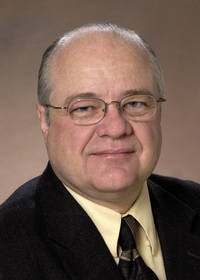 Jeffrey T. Clark
Jeffrey T. Clark
Professor of Anthropology – North Dakota State University (NDSU), USA
Resume
Dr. Jeffrey Clark, an archaeologist, has been a member of the NDSU faculty since 1983. His research interests include paleoenvironmental studies, human cultural and biological heritage, archaeological methods and theory, computer applications in archaeology, virtual environments for education and research, Oceania, Southeast Asia, and North America. Dr. Clark's primary teaching responsibilities are introduction to anthropology, archaeology, cultural ecology, peoples of the South Pacific, and human origins and he also oversees individual lab experience coursework and archaeological fieldschools in American Samoa. Dr. Clark received a grant from the National Science Foundation to equip the Archaeology Technologies Lab with the technology necessary to undertake 3D modeling.
Why do I support ArkéoTopia ?
As an archaeologist, I was captivated by the energy, the rigor and the quality of ArkéoTopia's work in popular science. I also appreciated that the association is not only the domaine of professional archaeologists, but also considers the role of amateur archaeologists and distinguishes them from looters. Finally, I was impressed that this universal program represents not just words but also deeds, as evidenced by the universality of its honorary committee, as it is not limited by French archaeology or classical archaeology. I was struck by the reasons that Jean-Olivier Gransard-Desmond, President of the association, gave for inviting me to be a collaborator of ArkéoTopia: "You're American and you work on Pacific archaeology. We want our honorary committee to reflect the variety that ArkéoTopia intends to represent." Since meeting at a symposium on computer applications for archaeology that I organized in Fargo in 2006, Dr. Gransard-Desmond and I have kept in touch. I have always appreciated his candor and openness, and I consider ArkéoTopia to be a good tool for improving contact between the public and researchers as well as a potentially important support for the archaeological community in the coming years. Therefore, I support the efforts of ArkéoTopia as an alternative approach to archaeology and I wish it the success it deserves.
Fargo, North Dakota
4th April 2011.
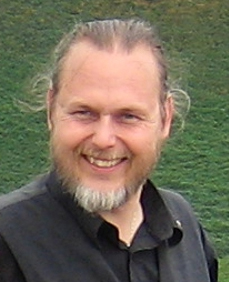 Raimund Karl
Raimund Karl
Professor of Archaeology and Heritage – School of History, Welsh History and Archaeology, Wales
Resume
Dr. Raimund Karl joined Bangor University as a lecturer in 2003, following a research fellowship at the Centre for Advanced Welsh and Celtic Studies at Aberystwyth. He has been head of the School of History, Welsh History and Archaeology at Bangor University since 2007 and is currently Professor of Archaeology and Heritage. He holds a doctorate in archaeology and a habilitation from the University of Vienna, Austria. His main research interests include 1st millennium BC and AD 'Celtic' landscape and social archaeology, archaeological methods and theory, the role of archaeology and archaeologists in contemporary society, public archaeology, and archaeological heritage management. He has been involved with several recent European research projects including Discovering the Archaeologists of Europe and Studying Archaeology in Europe.
Why do I support ArkéoTopia ?
It is through my research into archaeology in contemporary society, and particularly into the social, economic and educational situation of students of archaeology that I became aware of ArkéoTopia's work. I found it particularly encouraging and impressive that an organisation like ArkéoTopia looks beyond the relatively narrow confines of professional archaeology in France, and engages with and provides opportunities for a much broader range of the public, as well as archaeology students, to engage constructively and productively with the archaeological process. I was also particularly impressed with the energy and enthusiasm with which ArkéoTopia supports and participates in very important European projects, like Studying Archaeology in Europe, which aim at examining and better understanding the situation of the next generation of archaeological professionals while they still go through higher education; and its activities to support archaeology graduates in finding employment in the archaeological sector. Equally, its practical activities in the areas of amateur and voluntary archaeology are impressive, and provide a welcome vehicle and voice for the public that archaeologists should be working for to participate in various archaeological activities and popular archaeological science. I thus wholeheartedly support the efforts of ArkéoTopia and wish it the success it fully deserves.
Bangor, Gwynedd (Wales)
April 2, 2012.![]() Up to the beginning of the page
Up to the beginning of the page
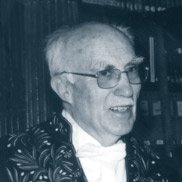 Jean Richard † 25 janvier 2021
Jean Richard † 25 janvier 2021
Historian, free Member of the Académie des Inscriptions et Belles-Lettres - Paris, France
Resume
Qualified as an archivist-paleographer in 1943, a member of the École française de Rome in 1947, Ph. D. in 1953, Jean Barthélémy Richard is a historian who has distinguished himself through his work on medieval history, notably about Bourgogne and the Latin East (crusades, eastern Latin States, Catholic missions in the East). As a former Dean of the Université de Dijon’s faculty of Humanities (1968-1971), Officer of the Légion d’Honneur, Commandor of the National Order of Merit, Great-Officer of the Ordre des Palmes académiques, and Chevalier of the Ordre des Arts et Lettres, Jean Barthélémy Richard was voted free membre of the Académie des Inscriptions et Belles-Lettres (AIBL), taking the place of Marcel Simono, on 3rd April 1987. He was president of the AIBL in 2002.
Why do I support ArkéoTopia ?
I was interested by ArkéoTopia's programme and having followed M. Poutiers' work (1), I agreed to be a part of this ambitious association’s Honorary Committee to support its work.
Paris, France
2nd May 2011![]() Up to the beginning of the page
Up to the beginning of the page
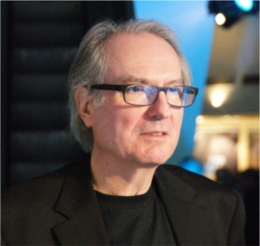
Registered architect and Amateur archaeologist – Paris, France
Resume
After graduating in architecture from art school in 1976, Jean-Pierre Houdin set up as an independant architect, a profession which he practiced for twenty years, participating in the construction of many housing and office structures around the Parisian area. In late 1996, he left for New York, where he learnt how to use the internet, how to draw using the first digital drawing programs, and got involved in creating internet sites. In 1999, his father, watching a TV programme about the construction of the pyramids, had the insight that the pyramids could have been built from the inside. He brought in his son Jean-Pierre, an architect and expert in 3D, to help him in his research and the Khufu's pyramid adventure began. In 2005, Jean-Pierre Houdin got the backing of Dassault Systèmes as part of the sponsorship programme entitled "Passion for Innovation", which allowed him to present Khufu revelaed in 2007, and then Khufu reborn in 2011. After 12 years of research, Jean-Paul Houdin revolutionised our knowledge about the construction of the Great Pyramid of Giza and about the Old Kingdom of Egypt, and he also introduced a fertile new working methodology for new generations of archeologists.
Why do I support ArkéoTopia ?
As an architect, I have met and I continue to meet a lot of reticence from the scientific community about my study and my work on the pyramid of Khufu. Although I have not had any academic training as an archeologist, my approach on the subject is nevertheless in keeping with the scientific approach as researchers such as D. Arnold, R. Stadelman and others I have met to date have confirmed to me, ArkéoTopia amongst them.
I made the acquaintance of Dr. Gransard-Desmond and ArkéoTopia at an evening event at the Géode (a giant spherical cinema in Paris). On this occasion, Dr. Gransard-Desmond did not hesitate to publicly speak out to confirm the unfortunately disasterous attitude of the scientific community towards me by stating that I was not an isolated case. He also added that, although a majority of archeologists depreciate quality work of amateurs, there are others who are perfectly conscious of the wealth these amateurs represent.
Since he wished to meet me, we arranged a meeting during which I discovered ArkéoTopia's approach: To give a different viewpoint to today’s archaeology in order to better help existing bodies and to prepare those of tomorrow by welcoming and supporting professionals and, equally, students and amateurs in the discipline, from France and abroad.
I was seduced by this innovative undertaking coming from a professional and the ethical approach upheld by the organisation which insists on the role of amateurs in the origins of today's discipline, and on the fact that research is not a privilege reserved for scientists who are necessarily more competent in understanding a site or document.
I do not claim to be a researcher. I am above all an architect, and so a designer. However, I fight for an open approach to research, implying creativity and rigor, which both amateur and professional may possess. For these reasons, I support ArkéoTopia’s effort towards an alternative approach to archaeology and wish is the best,
Paris, France
23rd August 2009![]() Up to the beginning of the page
Up to the beginning of the page
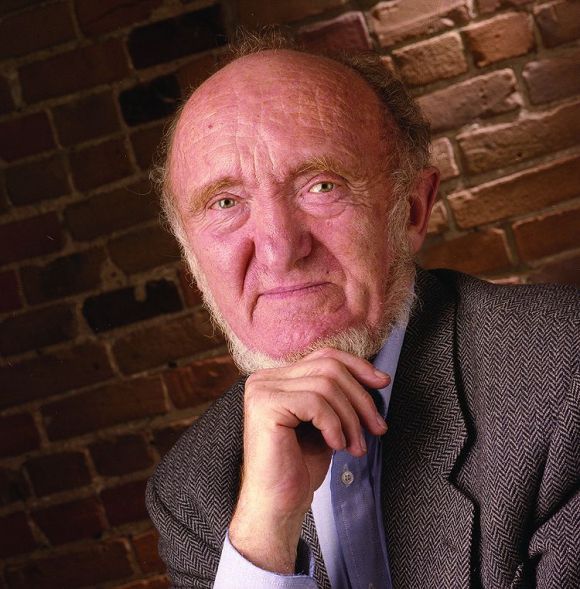 Albert Jacquard †
Albert Jacquard †
Geneticist and scientific populariser, Officier de la Légion of Honneur (Officer of the Legion of Honour) and commandeur de l’ordre national du Mérite (Commander of the National Order of Merit) – Paris, France
Resume
As a former student of the renound French ‘polytechnique’ university and graduate of the national institute of statistics and demographics, Albert Jacquard went onto specialize in population genetics after obtaining a university PhD in genetics and a higher-level state doctorate in human biology. He is currently a researcher at the University of Stanford (USA), and has also been a university professor at Paris VI, Luovin and Geneva. He was an expert in genetics for the World Health Organization from 1973 to 1985, and a member of the national consultative committee for life sciences and health from 1983 to 1988. Professor Albert Jacquard devotes most of his energy to working towards making science accessible to the general public or essays in which he tries to spread a humanist discourse aimed at aiding the evolution of collective consciousness. His work has earned him national recognition and his appointment to officier de la Légion d’honneur and commandeur de l’Ordre national du Mérite in 1980. This spread to international recognition, and the University of Quebec awarded him an honourary doctorate in 1987. As well as being involved in helping the most deprived, Albert Jacquard also supports any combat which he considers just, such as social justice or education, considered by him as being the major issue of the 21st century and a real agent of change. Aligned with the global justice movement, Albert Jacquard regularly contributes to the newspaper Le Monde Diplomatique.
In L’équation du nénuphar. Les plaisirs de la science (1998), professor Jaquard says “the education system is committing the same error when it abusively, and often exclusively, stresses the acquisition of knowledge and especially when it confuses science with its offspring, technique. […] Science is about understanding, while technique involves being effective.” In 2012, during his lectures about education, he again brought up this error in the education system in which the acquisition of knowledge appears more important than the use of knowledge.
Why do I support ArkéoTopia ?
As someone who makes science accessible to the general public, I appreciate the energy and the quality of ArkéoTopia’s work towards promoting a scientific approach taking archaeology as its support. I also appreciate the importance given to transmission [of knowledge] and to teaching whether for archaeology or generally to promote the humanist values which I share. When I was approached due to my role as a geneticist interested in increasing accessibility and stressing the importance of education in current societies to emphasise Arkéotopia’s targeted values of interdisciplinarity, of science involved in ordinary people’s everyday lives in a symbiotic relationship in which all take part, with the aim of restoring a wider appetite for science beyond the discipline of archaeology, I agreed.
Albert Jaquard
Paris, France
17 July 2012![]() Up to the beginning of the page
Up to the beginning of the page
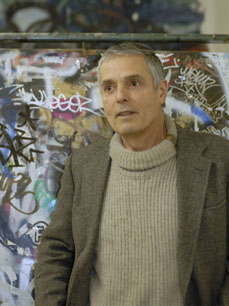 Jean-Paul Réti
Jean-Paul Réti
Sculptor – Paris, France
Timeline
Prizes and distinctions: Fulbright 2001-2003. USA Phx, AZ, ASU, AZ., Prix de Rome (Italy), Artist in Residence at the Mino Paper Art Village Project (Japan), National Prize for Sculpture (Prix National de Sculpture) (France), Mino Akari Arts Prize, 11th National Paper Sculpture Festival (Japan), Lauréat de la Fondation Elf , Prizewinner at the international and national Valloire competition (Alpes, France 1999), First prize for an urban work (COPRIM, Issy, France)... You want to know more, see the entire timeline on the artist's website.
As the journalist Philippe Thébault wrote it, "Reti is thought of within sculpture as the pioneer of the "Earth as seen from the sky" as shown through his first great works exhibited in Paris and Rome from 1982. A prize led him to Villa Medici, a Fulbright to the USA, then Akari in Japan. His works are located in these countries and in France as well as elsewhere. Giordano Bruno demonstrated in the 17th century that the Earth is not the centre of the universe and floats in infinite space, 'with neither top nor bottom.' Reti refereces this when creating floating landscapes and suspended 'grounds' facing the viewer. Since then he has continuously created sculptures (for the most part murals), urban landscapes showing grounds and also undergrounds in which volumes and projected shadows are associated. The combination of these two is observed as if the viewer were flying overhead. The horizon is erased. The sculptor allows the Earth to be observed as it is: an object evolving in infinite space without our reassuring or useful markers such as the horizon line and ground under our feet."
Why do I support ArkéoTopia ?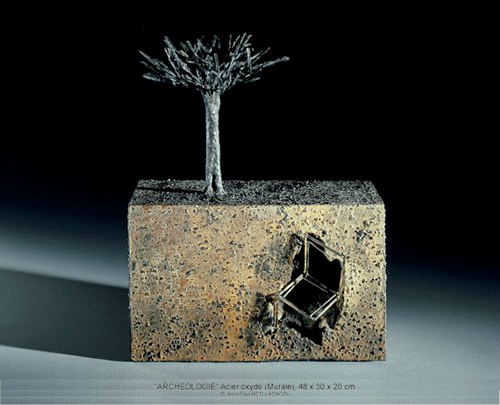 My first visit of underground galleries led me to encounter ArkéoTopia. As they say, it had to happen. Simply because in sculpture I often probe into the depths of the Earth. My works using steel show both the ground and urban undergrounds So our priorities are quite similar, at least in part. I call upon that which is hidden in order to show reality in its totality. ArkéoTopia excavates the past, also revealing what is hidden in its own way.
My first visit of underground galleries led me to encounter ArkéoTopia. As they say, it had to happen. Simply because in sculpture I often probe into the depths of the Earth. My works using steel show both the ground and urban undergrounds So our priorities are quite similar, at least in part. I call upon that which is hidden in order to show reality in its totality. ArkéoTopia excavates the past, also revealing what is hidden in its own way.
Although there are similarities in our approaches, there are inevitably differences. Also, although one of my sculptures bears the title "Archaeology," my approach towards soil strata arises from a completely different source which I would describe as serendipity. My father, a doctor and also a researcher (in the style of Professor Calculus in The Adventures of Tintin), threw himself into experiments not only in the laboratory, but also at home. That is how, thanks to him, I discovered the magic of the microscope. As he would often say: "our eyes only see things partially and they deceive us. You have to go beyond appearances." This maxim became second nature to me: not being satisfied by what is visible at first sight. Trying to examine a question from all sides is practically a philosophical stance. I apply this as far as possible to my sculptures.
The circle is complete: archaeology on one side, the sculptor that I am at the other, we are both trying to go beyond appearances. Even if our tools are different, as they say, all roads lead to Rome!
Jean-Paul Reti
Paris - France
11th July 2013
![]() 1. Jean-Christian Poutiers, Ph.D. in History and Ph.D. in Archaeology, President of the ARAM (Association Régionale des Aveugles et Malvoyants = Regional Association of the Blind andVisually Impaired), is one of ArkéoTopia's special partners.
1. Jean-Christian Poutiers, Ph.D. in History and Ph.D. in Archaeology, President of the ARAM (Association Régionale des Aveugles et Malvoyants = Regional Association of the Blind andVisually Impaired), is one of ArkéoTopia's special partners.![]() Up to the beginning of the page
Up to the beginning of the page






